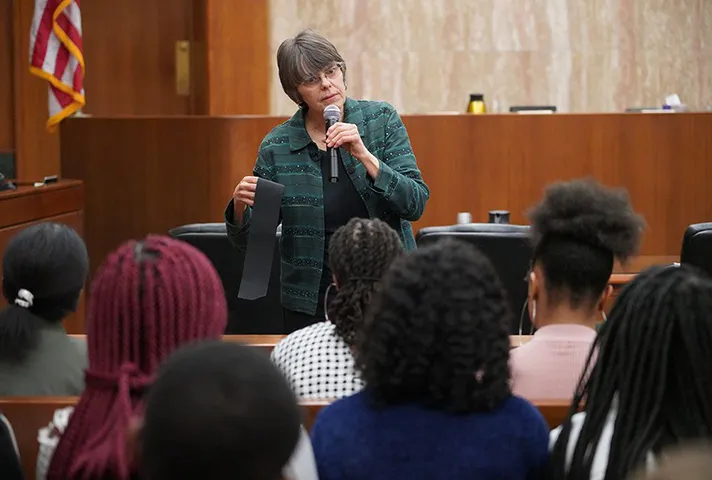Vietnam War protester Mary Beth Tinker has a message for young people who are worried about the state of the world: “Speak up about what is important to you.”
Tinker, whose landmark First Amendment case was decided by the Supreme Court in 1969, wore an armband to school to mourn the dead on both sides of the Vietnam War. Today, as she prepares for a Bill of Rights Day ceremony, she says she feels like wearing it again. This time in solidarity with the sadness of all students affected by gun violence.

Mary Beth Tinker shares with students the First Amendment legacy of the Supreme Court landmark case Tinker v. Des Moines during a court simulation at the DC federal courthouse in 2019.
“The First Amendment can save lives,” Tinker said. “Justice Hugo Black, who dissented in Tinker v. Des Moines, may have said that ‘children go to school to learn – not teach’ but students have a lot to teach the adults in their life. How to cope and survive in stressful times; how to keep growing and entertaining new ideas; how to incorporate new concepts into our thinking; and how to allow ourselves to change.”
To mark the anniversary of the Bill of Rights, on Dec. 15, Tinker will participate virtually in a ceremony prior to installing the armband in its temporary home in The Judicial Learning Center at the Thomas F. Eagleton U.S. Courthouse in St. Louis. Tinker’s family moved to St. Louis, where the Eighth Circuit Court of Appeals heard the case before it went to the Supreme Court.
The court also is hosting a free webinar for students and their teachers facilitated by Street Law. The program, sponsored by the Eighth Circuit, the U.S. District Court for the Eastern District of Missouri, and The Judicial Learning Center in St. Louis, features a discussion with Tinker on student speech related to her armband case and a more recent case involving a cheerleader’s post on Snapchat.
The first 10 Amendments to the U.S. Constitution are called the Bill of Rights. The document was ratified on Dec. 15, 1791, and President Franklin D. Roosevelt designated the date to be celebrated annually as Bill of Rights Day in 1941.
When asked about the 2021 Supreme Court’s decision in Mahanoy Area School District v. B. L., commonly referred to as the cheerleader Snapchat case, Tinker said, “It was important for B.L. to express herself.” The case dealt with a cheerleader’s expression of disappointment when she was not selected for the cheerleading squad at her high school in Mahanoy City, Pennsylvania.
“Some people say that B.L.’s expression wasn’t important compared to ours about the Vietnam War, but as a nurse who has worked with teens for many years, I believe it is important for young people to express themselves about issues affecting their lives, whether it’s cheerleading, climate change, school lunches, or race relations,” Tinker said.
Tinker, who now lives in Washington, D.C., acknowledges that speaking up is not without risk. “I was nervous and scared, but I spoke up anyway,” she said. “We can do brave things even when we don’t feel brave.” Although she received death threats and her family received bomb threats, “the risk was worth it.”
She said that when young people voice their values, they can ignite lifelong friendships, deepen attachments to their school, and establish ties in their communities.
“You never know what the positive ripple effects of your actions might be,” Tinker said. “Even when your efforts don’t achieve the results you want, if you don’t let your setbacks defeat or define you, you’ve still won by being part of a global and historical movement of young people changing their personal circumstances and the global community for the better.”
19th Amendment at 100
The journey toward justice connects two activists from different eras: suffragists wearing sashes marching for voting rights, with teens wearing black armbands protesting the Vietnam War.
Subscribe to News Updates
Subscribe to be notified when the news section is updated.
